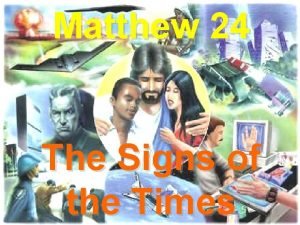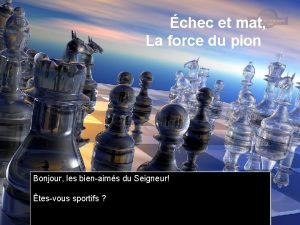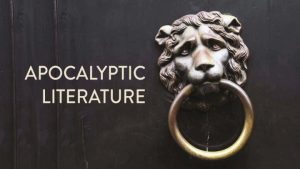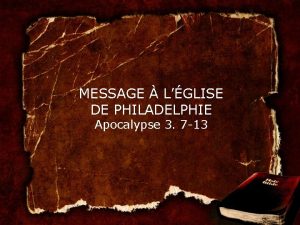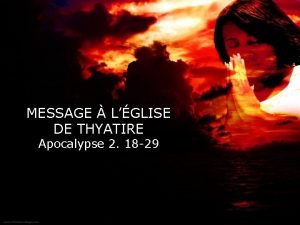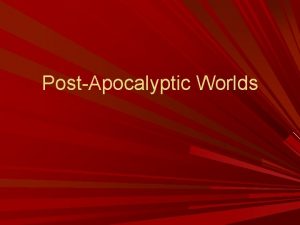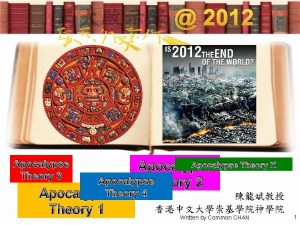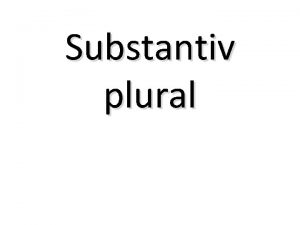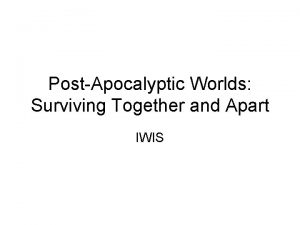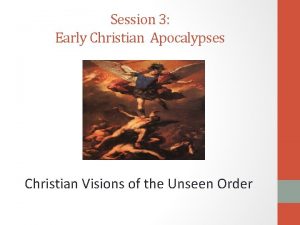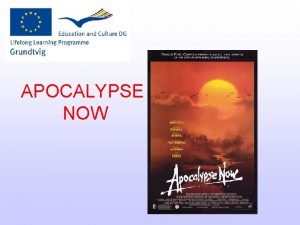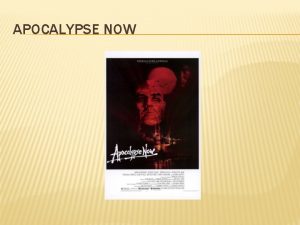PostApocalyptic Worlds Apocalypse apocalypse plural apocalypses n 1










- Slides: 10

Post-Apocalyptic Worlds

Apocalypse • a·poc·a·lypse (plural apoc·a·lypses) n • 1. total destruction: the total destruction or devastation of something, or an instance of this 2. revelation of future: a revelation made concerning the future • [13 th century. Via late Latin from Greek apokalupsis “revelation, ” from apokaluptein “to uncover, ” from kaluptein “to cover. ”] Microsoft® Encarta® Reference Library 2004.

Modern Apocalyptic Fears • • Disease Nuclear Accidents Nuclear Weapons Plagues Biological Weapons Over-population Global Warming Comets

The Effects of a Nuclear Bomb: • • • an explosive blast similar to the blast from ordinary chemical explosions (measured in megatons of TNT); direct nuclear radiation; direct thermal radiation (light & heat); pulses of electrical and magnetic energy, called electromagnetic pulse (EMP); the creation of a variety of radioactive particles and are called radioactive fallout when they return to Earth.

Nations with Nuclear Weapons • • • United States - 10, 640 Russia - 8, 600 People's Republic of China - 400 France - 350 United Kingdom - 200 India - 60 -90 Pakistan - 24 -48 Israel – 5 -15 (? ) From a high of 65, 000 weapons in 1985, there were about 40, 000 nuclear weapons in the world in 2002.

Reasons People were / are afraid: • Of the 7, 000 U. S. nuclear warheads, 2, 500 are maintained on hair-trigger alert, ready for launching. • In order to effectively retaliate, the commander of the Strategic Air Command has only three minutes to decide if a nuclear attack warning is valid. • He has 10 minutes to find the president for a 30 -second briefing on attack options. And the president has three minutes to decide whether to launch the warheads and at which targets. Once launched, the missiles would reach their Russian targets in 15 to 30 minutes.

M. A. D. • Mutually Assured Destruction – – The theory that peace can best be preserved if nations know that they cannot “afford” to start a war because both sides destruction is guaranteed. There must never be a scenario that would allow one side to “win”. Therefore it is better for both sides to have lots of very powerful weapons.

Nuclear Fears • 1947 | Seven minutes to midnight • – India and Pakistan “go public” with nuclear tests. – The United States and Russia can’t agree on further deep reductions in their stockpiles. – The clock first appears on the Bulletin cover as a symbol of nuclear danger. • 1949 | Three minutes to midnight – The Soviet Union explodes its first atomic bomb. • 1953 | Two minutes to midnight – The United States and the Soviet Union test thermonuclear devices within nine months of one another. 1998 | Nine minutes to midnight • 2002 | Seven minutes to midnight – Little progress is made on global nuclear disarmament. – The United States rejects a series of arms control treaties and announces it will withdraw from the Anti-Ballistic Missile Treaty. – Terrorists seek to acquire and use nuclear and biological weapons.

Post-Apocalyptic Novels • Characteristics: – – – Something has happened that has shaken human civilization to its roots; The characters in the novel often don’t understand or remember what the apocalyptic event was; The setting of the novel allows the author to present contemporary problems in a setting that highlights their importance.

Review • • • An apocalypse is the end of civilization; Nuclear weapons have threatened the world since the 1950’s; Nuclear bombs produce fallout which causes cancer, birth defects, and genetic damage; During the cold-war people feared both a purposeful and an accidental nuclear war between the U. S. and U. S. S. R. ; M. A. D. –mutually assured destruction; Post-apocalyptic stories are set after an apocalypse to make a point about our society.


